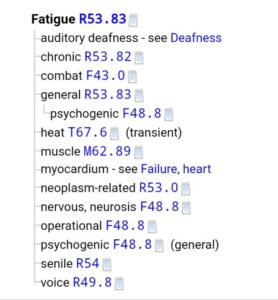Fatigue ICD 10
In In this topic we will see the types of fatigue, Fatigue ICD 10 codes description and guidelines along with examples.
All of us feel tired sometimes, but tiredness will go away after taking rest or after a good sleep. The term fatigue is not just tiredness, it is more than that.
Are you thinking is it something we really need to care about and treat?
Yes, it is., Extreme tiredness continuously for weeks that we can’t even get out of bed and do our daily activities is concerned and need to visit a doctor. Because this is a symptom of some other factor such as underlying disease, lack of sleep for long time or any mental stress or any other reason.
Studies have reported that chronic fatigue occurs as an after-effect of Covid-19 as well.
Types of fatigue:
Main types of Fatigue are mental and physical.
- Physical fatigue – Person is physically experiencing extreme tiredness and muscle weakness. This makes it difficult to perform daily activities which were done easily before.
- Mental fatigue – Here the person is unable to concentrate in anything and feels the brain is not working at all.
Most of the cases both mental and physical fatigue occurs together.
Symptoms, Diagnosis and Tests
Physician asks history of the patient and several questions regarding mental and physical health to confirm, if a person is fatigue or not. Other symptoms may include muscle weakness, fever, sore throat, headache and joint pain. Depending on that he may perform tests like CBC, TSH, blood sugar etc.
Fatigue ICD 10 codes and guidelines:
Synonyms – Below terms may also found in medical record which leads to ICD-10 for fatigue.
- Lethargy
- Overstrained
- Overworked
- Prostration
- Tiredness
- Chronic fatigue syndrome
Category R53.8 (malaise and fatigue) – There are chances coder may get confused with the term ‘malaise’. Both malaise and fatigue are common type of symptoms of a disease. Extreme tiredness is termed as fatigue and feeling of discomfort is termed as malaise. Both codes come under same category R53.8
Malaise — R53.81
Fatigue – R53.82, R53.83 (chronic)
Medical record should have documentation about the type of fatigue such as due to age (senile fatigue), psychological or chronic (lasts more than 6 weeks). If it is not documented clearly, that can be coded as general fatigue R53.83.
Can fatigue be coded primary – Fatigue should not be coded primary when a related definitive diagnosis is mentioned.

Fatigue ICD 10 Example-1:
Robert is a 68 year old male, here with complaints of chronic fatigue, right shoulder pain, anxiety, also follow up on COPD. He states that he needs help to get up from one place. He states he sleeps good, but tired during the day. He states he has no motivation. He states he is out of Dulera, but he just hasn’t picked up any refills from pharmacy. He chew tobacco, denies use of alcohol.
Physical exam documented as fatigue, hypertensive, shortness of breath, normal mental status to conversation, concentration and memory. Vitals were normal except BP 140/90 mm Hg
Assessment : Chronic fatigue, COPD, pain in right shoulder, generalized anxiety disorder, hypertension, tobacco dependence
Treatment plan for chronic fatigue: Benefits of sleep study discussed with patient. It is scheduled for tomorrow. He will be treated for nicotine dependence to improve breathing and energy level.
ICD-10 codes
- R53.82 – Chronic fatigue
- J44.9 – COPD
- M25.511 – Right shoulder pain
- F41.1 – Generalized anxiety disorder
- I10 – Hypertension
- F17.220 – chewing tobacco dependence
Fatigue ICD 10 Example – 2
Lisa Perez, 45 year old female visits hospital with her daughter for extreme fatigue. She is undergoing chemotherapy for her left Breast cancer. She does not have any significant history. She is a non-smoker and non-alcoholic. Daughter states that her mom sleeps for a longer time. She feels difficult to climb stairs.
Vitals showed temperature 97.7 F, BP 110/80 mm Hg, heart rate 64/min, respirations 15/min. Physical exam documented as fatigue, depressed, shortness of breath, tachycardia, dry skin, loss of memory, lack of concentration.
Lab tests were normal except CBC which showed hemoglobin 7.0 g/L
Patient was diagnosed with anemia and fatigue related to neoplasm, breast cancer, depression
ICD-10 codes
- C50.912 – Left breast cancer
- D63.0 – Anemia due to neoplasm
- R53.0 – Fatigue in neoplasm
- F32.9 – Depression
Note: In this scenario follow ‘code first’ note with R53.0. Also, following rule of not coding fatigue primary when there is underlying cause.